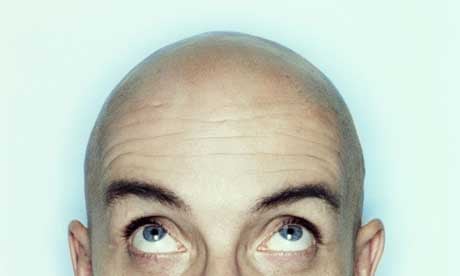Scientists have discovered a genetic link to baldness that helps explain why some men may inherit their shiny pates from their fathers.
Tests on more than 1,000 bald men revealed two gene regions that, active together, make a man seven times more likely to lose his hair. Around 14% of men are thought to carry both gene variants.
The findings give scientists a much clearer picture of the genetic causes of male pattern baldness, which affects roughly a third of men by the age of 45. Genetic factors are thought to account for at least 80% of the condition.
In the long term, the latest work is expected to pave the way for genetic treatments for hair loss, but more quickly it could be used to identify men who are likely to lose their hair prematurely. These men may benefit by beginning baldness treatments before they start showing signs of hair loss, the researchers said.
The search for baldness treatments has already seen the rise of a multimillion-pound industry in Britain alone, where an estimated 8 million men are affected.
One of the genes identified by the scientists was already known. It sits on the female X chromosome, meaning it is only passed from mother to son. The second gene region the study identified is new and gives researchers their first clue to how baldness may be passed from father to son. The tests showed one or more genes on chromosome 20 contribute substantially to male pattern baldness, although it is not clear what the genes do.
Two teams, one led by Tim Spector at King's College London, the other by Axel Hillmer at Bonn University, report similar findings in the Nature Genetics journal. "The one in seven men who carry both these risk factors are almost certain to go bald before the age of 50," said Spector.
The quest for baldness treatments irks some, who object to the assumption that shiny domes are undesirable, but Spector says many men experience psychological problems, including a loss of self-confidence, when their hair begins to thin.
"Baldness is a major cause of depression, social shyness and stigma for some people, particularly those who go bald in their early years," he said. "Hopefully this will encourage pharmaceutical companies to target these people with preventive gels and creams, which may be more effective than treatments used many years after the hair follicles have already died."
Male pattern baldness, where hair is lost from the temples and the crown, is the most common form of hair loss and is caused by an increase in a chemical called dihydrotestosterone, or DHT, which makes hair follicles produce thinner and thinner hairs until the follicles die off.
Hair loss can be caused by other changes in the body, however, including iron deficiency, an underactive thyroid, stress and scalp infections.
